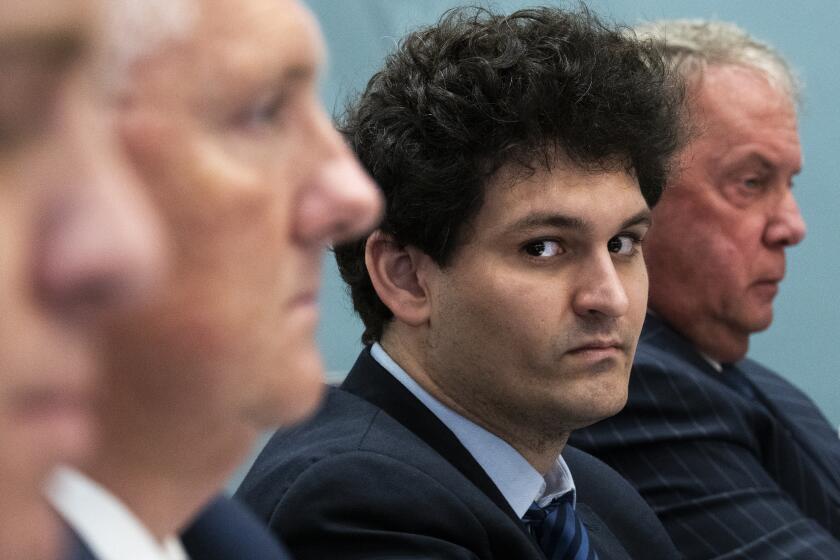Column: Molly White’s message for journalists going freelance — be ready for the pitfalls

- Share via
Molly White is the model of an indefatigable and intrepid journalist. Through her website Web3 is Going Just Great and newsletter Citation Needed, she keeps tabs on the hacks, scams, failures, hype and assorted legal difficulties swirling about the cryptocurrency world.
She’s also independent, which means she’s unprotected by the fortification of lawyers and resources erected by the owners of newspapers such as The Times to fend off legal threats, frivolous and otherwise, that are part of the arsenal of people and firms we write about.
So she has some advice for journalists tempted by the burden of having bosses to “just go independent,” enticed, say, by the siren call of freelancing: “Just do a substack! It’s the future of journalism.”
I am the legal team. I am the fact-checking department. I am the editorial staff. I am the one responsible for triple-checking every single statement I make in the type of original reporting that I know carries a serious risk of baseless but ruinously expensive litigation regularly used to silence journalists, critics, and whistleblowers.
— Molly White
White’s warning is, in a nutshell: “It’s not for everyone.”
Anyone who follows crypto scams is familiar with White’s work. A software engineer by training, she is a longtime Wikipedia editor who got interested in the dark underbelly of crypto when she tried to write a Wikipedia article about it.
Get the latest from Michael Hiltzik
Commentary on economics and more from a Pulitzer Prize winner.
You may occasionally receive promotional content from the Los Angeles Times.
She doesn’t find much if anything to like about the field, which she sees as a hive of people aiming to take advantage of the innocent and unwary — the facetious subtitle of her Web3 website calls it “definitely not an enormous grift that’s pouring lighter fluid on our already smoldering planet.”
But she does it all by herself.
“As an independent writer and publisher,” White wrote recently, “I am the legal team. I am the fact-checking department. I am the editorial staff. I am the one responsible for triple-checking every single statement I make in the type of original reporting that I know carries a serious risk of baseless but ruinously expensive litigation regularly used to silence journalists, critics, and whistleblowers.... I am the one who ultimately could be financially ruined by such a lawsuit. I am the one in charge of weighing whether I should spring for the type of insurance that is standard fare for big outlets to protect themselves and their staff, but often prohibitively expensive for independent writers.”
Column: Trump and his family jump into crypto, which the FBI calls a hive of ‘pervasive’ criminality
A new FBI report says the U.S. is the world center of crypto fraud. Donald Trump and his family just announced a big crypto venture.
In recent weeks, White has had to fend off a couple of fatuous legal threats stemming from her work — one from a putative lawyer demanding that she take down a post for infringing a copyright under the Digital Millennium Copyright Act (it wasn’t an infringement), and some sinister legalistic-sounding noise from the crypto platform Coinbase. We’ll return to both in a moment.
Experts in the potholes and pitfalls facing writers — especially investigation-minded or merely activist journalists — say they’ve received a rising number of inquiries from those considering launching a freelance career. Lloyd Jassin, a New York lawyer specializing in publishing law — including copyright and libel law, among other issues important to independent writers — says he’s referred several clients to brokers who represent insurance firms for writers in the last few months.
Curiosity about the freelance life is rising for several reasons. Mass layoffs in the media industry have put thousands of journalists on the street, forcing them to ponder new ways to exercise their professional skills.
Substack and other such platforms purport to offer writers a way to acquire followers of their own, building their personal brands. And the performance of established news media in the recent election, including the decision of the owners of The Times and the Washington Post not to endorse a presidential candidate, may have inspired established staffers to consider an exit from corporate media.
Independent writers’ works are protected, if theoretically, by U.S. libel laws, which discourage defamation lawsuits by public figures, and by so-called SLAPP laws, which discourage “strategic lawsuits against public participation” — that is, lawsuits designed chiefly to intimidate or silence critics. But exercising one’s rights under those laws can require hiring a lawyer, sometimes at considerable expense. Plaintiffs deemed to have filed a SLAPP lawsuit can be required to cover the defendant’s legal costs, but that would happen only after motions in court.
White is no stranger to efforts to intimidate her. The most concentrated pushback she has received recently has come from Coinbase. The crypto platform is irked at White’s reporting that it may have violated federal law by making political contributions while negotiating for and subsequently holding a federal contract.
Cryptocurrency advocates are spending millions in political donations to obtain huge gaps in crypto regulations. They’re getting their money’s worth
In conjunction with the watchdog group Public Citizen, White filed a formal complaint against Coinbase with the Federal Election Commission on Aug. 1. In her reporting, White has shown that some of its contributions to the crypto industry super PAC Fairshake were made within the period in which political contributions are barred, which extends from the start of a contributor’s contract negotiations through the completion of the contract. The U.S. Marshals Service awarded Coinbase the $7-million, one-year contract to help manage the government’s hoard of seized crypto assets in July.
Coinbase hasn’t responded directly to White. Its response to the accusation has come through a series of tweets by its chief legal officer, Paul Grewal.
The gist of Grewal’s argument is that the funding for Coinbase’s contract comes from seized crypto assets in the Justice Department’s Assets Forfeiture Fund, not from congressional appropriations. Therefore, he contends, Coinbase didn’t violate the law prohibiting political contributions by contractors paid from “funds appropriated by the Congress.”
“Seized crypto assets are not Congressionally appropriated funds, period,” Grewal wrote.
As it happens, the legal question is far from being so cut and dried. In fact, the definition of “appropriated” was settled conclusively by the Supreme Court, in a 7-2 decision handed down in May and written by Justice Clarence Thomas. The only dissenters were justices Samuel A. Alito Jr. and Neil M. Gorsuch.
Sam Bankman-Fried wanted to make cryptocurrency look legitimate. He only added to the evidence that it’s not to be trusted.
In that case, the justices turned away a challenge to the funding of the Consumer Financial Protection Bureau, which derives from the Federal Reserve System. (The plaintiffs made an elaborately legalistic argument that such funding violates the “appropriations clause” of the Constitution and therefore the CFPB is unconstitutional.)
Thomas wrote that the plaintiffs had offered “no defensible argument” that the appropriations clause requires more than a congressional law authorizing “the disbursement of specified funds for identified purposes,” as was the funding for the CFPB.
By extension, so is the funding for the Coinbase contract. Indeed, the Congressional Research Service, in a close examination of the Assets Forfeiture Fund in 2015, found that for most purposes, the fund was the beneficiary of “a permanent appropriation” by Congress.
Grewal went further. Noting that he had placed his interpretation of the law on the record, he wrote that “repeating misrepresentations of facts after previously being put on notice is …. unwise.”
That sinister ellipsis is Grewal’s.
Grewal told me by email that no legal threat was implied by his tweet, and that Coinbase “certainly would make plain if it were our intent” to progress to a lawsuit.
Column: Shame, suicide attempts, ‘financial death’ — the devastating toll of a crypto firm’s failure
Customers of the bankrupt Celsius reveal how the cryptocurrency firm’s collapse upended their lives.
Still, White interpreted Grewal’s tweet as “certainly a threat of something. I don’t think Coinbase is going to come and break my kneecaps, so a legal threat is the most obvious interpretation. It seems like a pretty clear threat to stop writing about this, or else.”
Public Citizen is sanguine about Coinbase’s swaggering. “Whenever corporate misconduct is pointed out, they always say ‘We didn’t really break the law, or the law doesn’t apply to us the way you think it does,’” says Rick Claypool, a research director at Public Citizen who co-filed the complaint with White. “It would be surprising if they said, ‘Oh, yeah, you’re right, whoops.’ Going up against a Goliath, they have a lot of strength to squish the Davids coming after them.”
Separately, White fielded a “takedown” notice from supposed representatives of Roman Ziemian, a co-founder of the alleged crypto pyramid scheme FutureNet. In an Aug. 19 post on Web3 is Going Just Great, White posted news reports that Ziemian had been arrested in Montenegro, and that he faces international warrants from authorities in Poland and South Korea.
The representatives tried to bribe her $500 to take down the post. When she refused, they copied the post to a blogging website, backdated it, and then claimed she had plagiarized it in an example of copyright infringement. She posted the notice, which came from a purported lawyer named Michael Woods with a Los Angeles address that doesn’t exist in Postal Service records. He didn’t respond to a message I left at the telephone number he listed.
How can independent journalists keep intimidation efforts like these at arm’s length? The goal of those threatening legal action, no matter how frivolous, is “to suppress criticism,” Jassin says. “Being a good journalist is the first defense,” he adds, so getting the facts right is indispensable.
White doesn’t keep a lawyer on retainer, but she knows lawyers who are “willing to glance at something I’ve received in my email inbox and reach out to offer support should one of those threats escalate into something more tangible” — which hasn’t yet happened.
“In a perfect world, reporting the facts would be enough to avoid frivolous lawsuits,” she told me. “But obviously, companies and people with resources are willing to file frivolous lawsuits regardless. That is a risk I take on, with hopes that being cautious and being very careful about fact-checking will at least stave off the worst.”
She advises journalists thinking about going independent to “think through if it would be life-altering to be on the risky end of an actual lawsuit.” There are ways, she notes, to “structure your business so you’re not risking your personal assets,” including finding insurance to cover one’s legal defense.
“Legal threats are only one component” of life as a freelancer. “There are a lot of other challenges — you don’t have employer-sponsored healthcare, or a 401k. A lot of readers think it’s an easy decision to quit a job and go independent. But despite all the challenges, I really love being independent.”
More to Read
Get the latest from Michael Hiltzik
Commentary on economics and more from a Pulitzer Prize winner.
You may occasionally receive promotional content from the Los Angeles Times.















